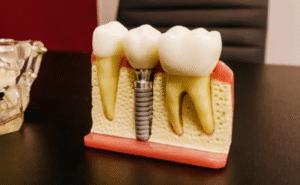Dental implants have transformed restorative dentistry, providing a long-lasting solution for missing teeth with results that look, feel, and function like natural teeth. If you’re considering implants in India, you’re likely wondering: How long do dental implants last, and what is their success rate? Here’s an in-depth, original guide to help you make an informed decision.
How Long Do Dental Implants Last?
The Implant Post

The titanium (or zirconia) implant post—the artificial root placed in the jawbone—is designed to last a lifetime in most cases. Once the process of osseointegration (bonding with your jawbone) is complete, and so long as there’s no untreated gum disease, trauma, or severe bone loss, the implant itself usually never needs to be replaced.
The Abutment and Crown
- Crown (the visible, tooth-like cap):
Although the implant post can permanently remain, the crown experiences daily wear and tear. In India and globally, crowns typically last 10–15 yearsbefore they may need replacement due to chipping, wear, or changes in the bite. - Abutment (connector piece):
This is also highly durable but might require replacement in rare cases due to damage or mechanical failure.
Can Implants Really Last a Lifetime?
With proper care, dental implants can last 25–30 years or longer. There are many documented cases of implants remaining healthy and functional for over 30 years. Longevity depends on your oral hygiene, lifestyle, overall health, and the expertise of your dental team.
Success Rate of Dental Implants in India

Global and Indian Success Rates
- Average Success Rate Globally:
Most studies show a 90–95% success rate over 10 yearsfor implant posts, with slightly lower rates for crowns (due to normal wear). - In India:
The success rate is comparable to international standards, consistently reported as above 90% over a 10-year period—and many clinics have records of implants lasting 15 years or more with extremely high patient satisfaction.
Key Point: With premium materials, trained implantologists, and adherence to best protocols, India’s best clinics achieve success rates rivaling the US and Europe.
Key Factors Influencing Longevity and Success
Oral Hygiene: Neglecting brushing, flossing, or professional cleanings can cause infections around the implant, risking failure. Good daily oral care is vital for implant longevity.
Surgeon’s Skill and Technology: An experienced implantologist familiar with advanced surgical guidance and digital imaging decreases risks and improves placement precision.
Bone Quality: A strong, healthy jawbone ensures stability. Pre-implant bone grafting may be recommended if there’s inadequate bone support.
Health Conditions: Properly managed diabetes, osteoporosis, or autoimmune conditions are crucial. Unmanaged conditions can hinder healing.
Lifestyle Habits
Smoking: Greatly increases the risk of implant failure—failure rates in smokers can more than double compared to non-smokers.
Bruxism (teeth grinding): Can cause mechanical stress and micro-movements, threatening implant stability.
Location in the Mouth: Implants in high-pressure areas (back molars) may wear faster due to chewing forces, but still last over a decade with care.
Tips to Prolong the Life of Your Dental Implants
- Practice meticulous oral hygiene: brush, floss, and consider an interdental brush.
- Schedule professional cleanings and exams every 6 months.
- Avoid biting down on hard objects (like pens or ice) and using your teeth as tools.
- Stop or reduce smoking and manage underlying health conditions.
- Wear a nightguard if you grind your teeth.
Risks and Causes of Implant Failure

Although rare, failures can happen. Typical causes include:
- Peri-implantitis:Infection of tissue around the implant, often from poor hygiene.
- Insufficient bone:Leading to instability.
- Poor surgical technique.
- Uncontrolled systemic conditions.
- Chronic smoking or bruxism.
Most failures occur within the first year (due to poor healing), but late failures can happen due to infection or overload. Early intervention can salvage many situations.
How Do Dental Implants Compare with Other Tooth Replacement Options?
| Treatment | Average Lifespan | Success Rate (10 years) | Notes |
| Dental Implants | 25+ years (post), 10–15 years (crown) | 90–95% | Potentially lifetime with good care |
| Dental Bridges | 10–15 years | ~85% | Adjacent teeth need modification |
| Dentures | 5–10 years | N/A | Less stable, need frequent adjustments |
Final Takeaway
Dental implants, when placed by an experienced professional and maintained properly, can last decades—often a lifetime. The average success rate in India is over 90% at 10 years, making implants a safe, proven, and long-lasting solution for tooth replacement.
Your habits and your dentist’s skills are key:
Invest in quality care from the start, maintain great oral hygiene, and you’ll enjoy the comfort, aesthetics, and strength of dental implants for many years to come.
Considering implants? Book a consultation with a skilled implantologist to discuss your candidacy and long-term outlook for a healthy, lasting smile!
